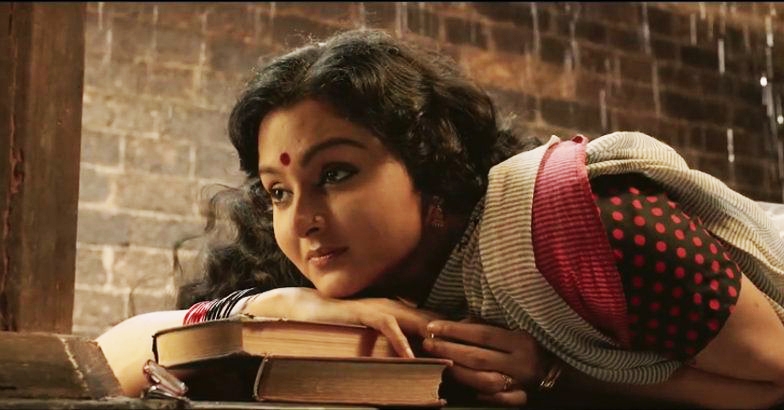
Neermathalam, the serpents’ abode, the constant bickering of servants at the Nalapattu home and the scent of the first monsoon in Punnayurkulam. Kamala Das never penned mere stories. More popularly known as Madhavikutty in Kerala, Kamala’s pen beamed with a tint of personal essence that these elements smoothly made way to the readers’ immediate universe. She possessed the power to be within any man or woman and also to engender their respective alter egos that they never knew existed. Be it her stoic demeanour or the inarticulate spoken Malayalam, we have seen and admired all of it with great fondness. Lovingly referred to as ‘Aami’ by many, I would say that a biopic celebrating her might and liberation was some sort of a requisite in Kerala’s cultural galaxy.
Writer-director Kamal pens the screenplay of his dream project Aami like an obsessed fanboy. You chuckle cheerfully as he intersperses several of Kamala’s anecdotes in a wayward attempt to not miss out on addressing his favourite bits. Subtexts are notably absent in Kamal’s writing though. He feels the need to make his characters vocally express everything that they have in mind. Despite this excess exposition and stagey narration by the lead actor, Kamal somehow succeeds in bringing the Nalappatt house and the surroundings alive on screen. A great deal of aid comes from M. Jayachandran’s melodious soundtrack that runs throughout – as if the film were to be a full-blown musical but later got toned down with obstructive dialogues. Madhu Neelakandan’s cinematography captures the affluent Kerala society from pre-Independence India with remarkable dexterity. No, we don’t get to see the exteriors, the villages and the local culture much. It is just Kamala’s miniature world that also lets us discover the roots of her worldview.
Aami progresses through Kamala discovering her love for Lord Krishna (Tovino Thomas, in his dreamboat self), experiencing infatuation for the first time with her art tutor and ultimately growing up into a marriageable young girl. The pacing is just right, and the storyline laced with Shreya Ghoshal’s dreamy voice gets half the job done. Most of Kamal’s narrative devices work in this phase and the romance with Krishna looks more than profound. The languid, unhurried quality of the frames resemble a breezy television show or web series. It’s almost towards the midpoint of the film that the unthinkable happens. Kamala grows up.
Until then, the adult Kamala (Manju Warrier) was present mostly with her voiceover. One that is forcefully slow and flaunting a strangely construed Thrissur accent, Warrier’s narration contains the power to grate on your nerves. Eventually, when she takes over as the grown-up version of the author, we simply cannot stop sighing at the amount of disbelief that she brings in. Mind you, Warrier has a very positive face. Her smile could possibly bloom a thousand water lilies but that isn’t what Kamala Das means to us.
As Manju progresses (read sleepwalks) through Aami, we discern a million imageries wither. Ones that we had about Kamala upon reading her languid memoirs or the hopes that Kamal had built up until then with a couple of fairly decent actors embodying the writer’s younger selves. Warrier appears too immersed in transforming herself extrinsically that the soul of Kamala refuses to enter her being. Also, the actor’s unconcealed air of being a home-bred Malayali appears to be anything but Madhavikutty. The famous writer, for the records, was mostly a non-resident of the state and, hence, the outsider’s perspective and the resultant amusement had the inkling to mesmerize her readers. In stark contrast, Warrier seems so big a part of the environment that she is supposed to be entertained by. With that awkward Malayalam-tinged English diction, Warrier is far cry from the multi-lingual personality who was well-travelled, spoke three languages and wrote in two.
ALSO READ: ‘C/O Saira Banu’ review – Manju Warrier lends gravitas to this powerful tale of love
While it is indeed difficult to come to terms with this scathing casting mishap, Kamal’s screenplay begins to meander post interval. The atmosphere that was highly lyrical thus far enters into territories that simply don’t join the dots. Aami, by the last reel, is a collection of disjointed events from Madhavikutty’s life that exhibits patches of a rough job the editing table or a case of hurried writing to include significant bits. As a result, we see several characters appearing to only to make brief statements that are needless in the larger scheme of things. Neither do they add much to the narrative nor do they reduce the fatigue that has already been set in by an overflow of similar sequences. In hindsight, Kamala reading her fan letters in the earlier half elicits a bigger impact than the unexciting visitors at her home.
And just when I had thought it was Warrier who reared zero insights on the weather around her, Anoop Menon shows up as her fan cum lover, Akbar Ali. Menon’s plastic turn is not only the film’s most tasteless element but also, unarguably, the actor’s worst performance till date. As someone who contributes to Kamala conversion to Islam, Menon and Warrier’s interactions reflect the kind of artifice that you seldom see in cinema. And this statement is not with regards to the poetic lines they mouth. It is in the way Kamal designs these characters, their aspirations despite his mind-boggling inability to read the complex human mind.
“Thadakathinu mele vanna kaattu pole aayirunnu Akbar. Kaattine pidichu nirthan thadakathinavumo?”
This metaphor that compares the wind that blows atop a placid lake to their relationship. If only the actors could whip up a camaraderie as tempestuous as the lines they are given.
Having said that, Aami is not fully devoid of moments. Even with Manju in it, the finest scene in the latter half is the night of Madhava Das’s (Murali Gopi) death. Although quite high on melodrama, it can’t be denied that the actress pulls it off. The brief scene that follows which brings Kamala back to the shade of Neermathalam is another tiny bright spot. Kamala’s brief hallucination about a handsome young man (Rahul Madhav) who haunts her everywhere from the beach to the corridors is, yet again, neatly composed. It only helps that these moments see Warrier sans dialogues.
ALSO READ: ‘Asuran’ review – a revenge saga with a statement on India’s caste-class divide
Talking about dialogues, Kamal’s Aami is needlessly talky. Madhavikutty might have been a chatty woman but it is as if the filmmaker distrusts his viewers’ intellect to absorb visual cues. There are several things that he makes his protagonists utter but they never end up expressing the same. For instance, Kamala professes her love for her children multiple times in the film but we never get a glimpse of her status quo with them as adults. This could also be attributed to Kamal’s attempt to even out the author’s otherwise contradicting persona, which became all the more conspicuous in her later years. We see a definite reason upon why she chooses to embrace the purdah but her followers might have already heard her declaring the virtues of the garment. Yes, the disillusionment of being wronged runs intensely in Kamal’s film but it is a lot less than what we, as the audience, might feel upon viewing a colourless version of Malayalam literature’s most vivid female wordsmith of all times.
Rating: ★★ 1/2


felt the same, brother. that can’t be my kamala. wish it wasn’t made. sigh.